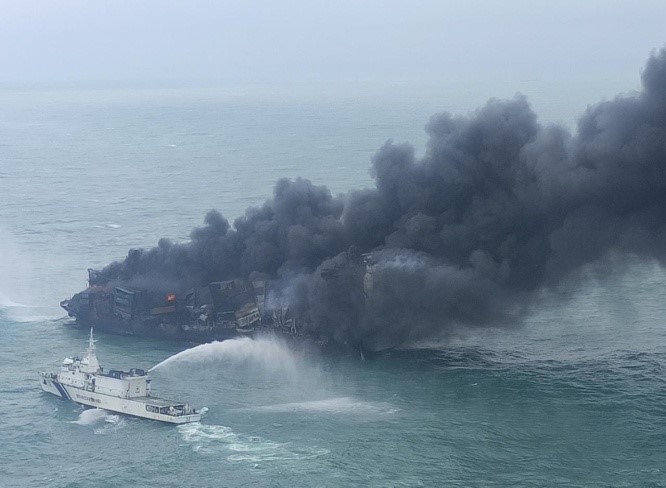With cargo ship MV X-Press Pearl sinking near the Colombo Port, the island nation is bracing itself for an environmental disaster. However, experts say the environmental impact of the sunken ship will be felt in a belt ranging from Somalia to Indonesia, while affecting both the coasts of India.
The Singapore-flagged MV X-Press Pearl was carrying nitric acid, chemicals and plastics when it caught fire on May 20. Initially the Sri Lankan authorities tried firefighting but a few days later sought Indian help as the fire raged continuously.
Efforts to tow away the damaged ship away from the coastline failed as part of the ship got wedged in the seabed. Sri Lanka is worried that the chemicals, plastics and oil could harm the marine environment and also pollute the beaches.
In an email reply to India Narrative, Prof. Charitha Pattiaratchi, professor of oceanography from the University of Western Australia, said: “The plastics last forever, so the impact will be for many decades to come.” He added that the impact of the disaster will be geographically vast. The damage to the Indian Ocean will stretch from, “Somalia to Indonesia, including Maldives,” adding that both sides of the Indian coastline will suffer due to the sunken cargo ship.
Sri Lanka's coastline is already flooded with various debris including tons of plastic pellets from the ship. There also are fears that oil from the ship's fuel tank could leak into the sea, creating a bigger environmental problem.
The country has already deputed soldiers along the beaches and is keeping curious people away from collecting the ship's debris. It has banned fishing in a vicinity of 80 km from the coastline.
The Indian Ocean island nation is also known for its pristine beaches. For Sri Lanka, this has been the worst environmental disaster that it has ever seen.
Sri Lankan Marine biologist, Dr Asha de Vos, told India Narrative that the cargo ship was carrying plastic polymers and resins. The ship released polyethylene which is lighter than water therefore these plastics will float and may aggregate on water, which will make it easy to collect these.
She adds that the size of the released plastic pellets is small which indicates that only the smaller animals will be at risk. Also, over time these plastics will break into smaller microplastics and nanoplastics, which may be more likely to be taken up by an organism and cause toxicity.
Dr de Vos said: “Plastics the size of nurdles (small plastic pellets), if consumed by most fish, are likely to pass completely through the intestine and be excreted. However, that means any fish or shellfish that are eaten whole (including their digestive tract) could have nurdles in them.”
Besides the animals, the plastics from the ship will have other impacts on the coastline. De Vos says: “… each type of habitat will react differently to the presence of plastics. But more sensitive parts of the coastline, such as mangroves or coral reefs, will require careful consideration and planning so that clean-up efforts do not cause more damage than the plastic itself.”
For the moment Sri Lanka is now preparing itself to tackle any possible oil slicks if there is an oil spill from the ill-fated ship. Sri Lankan news channels are telecasting images of dead marine life like fish and turtles that have been washing up on the shores.
The X-Press Pearl was transporting 1,486 containers, including 25 tons of nitric acid, and other chemicals and cosmetics.
Sri Lankan navy spokesman Indika de Silva said the navy and coast guard were preparing for a spill with assistance from neighboring India. India has been supporting the Sri Lankan rescue efforts through three ships, including a specialist ship dealing with marine pollution.
The Sri Lankan police is investigating the cause of the fire and have banned the captain, the engineer and the assistant engineer from leaving the country. The government has also said that it will take legal action against the ship owners for compensation. Sri Lanka’s Environment Minister Mahinda Amaraweera said “it wouldn’t be an easy task to calculate the damage caused to our environment.”




















